Related Research Articles

SuperStar was an Arabic television show based on the popular British show Pop Idol created by Simon Fuller's 19 Entertainment & developed by Fremantle Media. The show unites the Arab community by democratically choosing the next singing sensation. The show is broadcast worldwide on Future TV, a Lebanese television station. It is also the first Idol franchise to feature contestants from multiple countries.
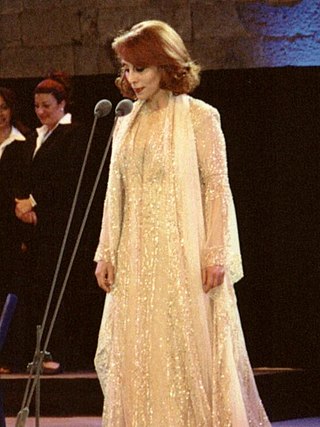
Nouhad Wadie Haddad, known as Fairuz, is a Lebanese singer. She is widely considered an iconic vocalist and one of the most celebrated singers in the history of the Arab world. She is popularly known as "The Bird Of The East," "The Cedar Of Lebanon," "The Moon's Neighbor", and “The Voice Of Lebanon”, among others.
Haddad is an Arabic surname meaning blacksmith, commonly used in the Levant and Algeria.

Arab diaspora is a term that refers to descendants of the Arab emigrants who, voluntarily or as forcibly, migrated from their native lands to non-Arab countries, primarily in the Americas, Europe, Southeast Asia, and West Africa.

Lebanese diaspora refers to Lebanese migrants and their descendants who emigrated from Lebanon and now reside in other countries. There are more Lebanese living outside Lebanon, than within the country. The diaspora population consists of Christians, Muslims, Druze, and Jews. The Christians trace their origin to several waves of emigration, starting with the exodus that followed the 1860 Lebanon conflict in Ottoman empire.

The Lebanese people are the people inhabiting or originating from Lebanon. The term may also include those who had inhabited Mount Lebanon and the Anti-Lebanon Mountains prior to the creation of the modern Lebanese state. The major religious groups among the Lebanese people within Lebanon are Shia Muslims (27%), Sunni Muslims (27%), Maronite Christians (21%), Greek Orthodox Christians (8%), Melkite Christians (5%), Druze (5%), Protestant Christians (1%). The largest contingent of Lebanese, however, comprise a diaspora in North America, South America, Europe, Australia and Africa, which is predominantly Maronite Christian.
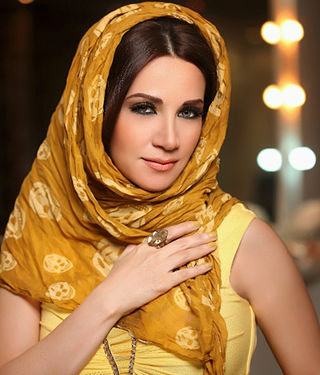
Diana Haddad is a Lebanese actress, singer, and television personality who also holds Emirati citizenship and is based in the United Arab Emirates. Haddad is one of the most popular Arabic pop musicians in the Arab World and has been so since the mid-1990s. Her debut album Saken (1996) was one of the best selling albums of 1996, being certified platinum by Haddad's label Stallions Records. The album also introduced Haddad and her Bedouin music style to the public.
Armenians in the Middle East are mostly concentrated in Iran, Lebanon, Cyprus, Syria, Jordan, Saudi Arabia and Jerusalem, although well-established communities exist in Iraq, Egypt, Turkey and other countries of the area including, of course, Armenia itself. They tend to speak the western dialect of the Armenian language and the majority are adherents of the Armenian Apostolic Church, with smaller Catholic and Protestant minorities. There is a sizable Armenian population in the thousands in Israel. There is also the Armenian Quarter in Jerusalem with a history that goes back 2,000 years.
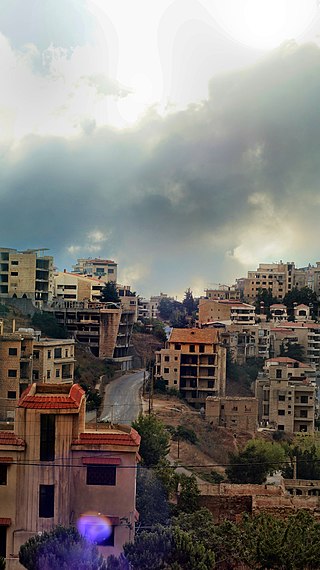
Bhamdoun, is a town in Lebanon 23 km (14 mi) from Beirut on the main road that leads to Damascus and in the suburbs of the main tourist city of Aley, lying at an altitude of 1,150 m (3,770 ft) above the Lamartine valley. Two separate villages compose the town, Bhamdoun-el-mhatta and Bhamdoun-el-day'aa. A railroad used to link Bhamdoun to Beirut with the train station being a prominent feature of the town for many years. The station and railroad were eventually abandoned when cars became more popular.
Arab Colombians refers to Arab immigrants and their descendants in the Republic of Colombia. Most of the migrants came from Lebanon, Jordan, Syria and Palestine. When they were first processed in the ports of Colombia, they were classified as Turks because what is now Lebanon, Syria, Jordan and Palestine were then territories of the Ottoman Empire. It is estimated that Colombia has a Lebanese population of 3.2 million. Meanwhile the Palestine population is estimated between 100,000-120,000.

Joumana Haddad is a Lebanese author, public speaker, journalist and human rights activist. She has been selected as one of the world’s 100 most powerful Arab women by Arabian Business Magazine for her cultural and social activism. In 2021, she was on Apolitical's list of 100 most influential people in Gender Policy. She is founder of Jasad, a quarterly Arabic-language magazine specialized in the arts and literature of the body (2009–2011). Haddad launched a new TV show in November 2018 on Alhurra highlighting the topics of free expression and critical thinking. In September 2019, she founded a youth centered NGO in Beirut called the Joumana Haddad Freedoms Center. In February 2020, in partnership with the Institut Français in Lebanon, she launched the first International Feminisms Festival in the Middle East with a group of local and international co-organizers.
Ethnic Armenians in Qatar number between 800 and 1,500 and live mainly in the capital Doha. Unofficial sources place them at around 5,500.
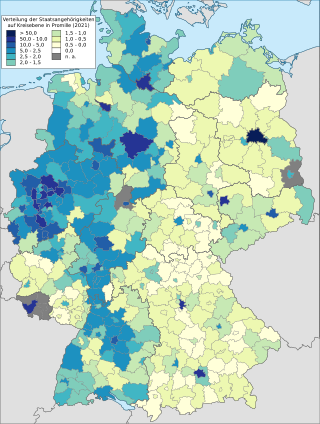
Arab Germans, also referred to as German Arabs or Arabic Germans, are ethnic Arabs living in Germany. They form the second-largest predominantly Muslim immigrant group in Germany after the large Turkish German community.
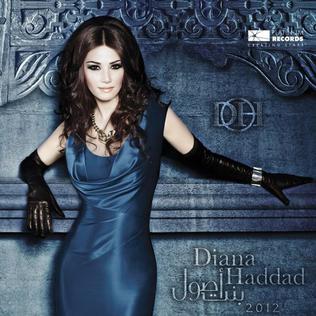
Bent Osol is the twelfth studio album by Lebanese recording artist Diana Haddad. The album was released by Platinum Records Christmas 2011. Bent Osol marks Haddad's first album in various Arabic dialects since her 2006 self-titled album Diana 2006 (2006).

The Palestinian diaspora, part of the wider Arab diaspora, are Palestinian people living outside the region of Palestine.
Lebanese people in the United Arab Emirates have a population exceeding 80,000, closer estimates report a total of 156,000 Lebanese in the Emirates. Lebanese people form one of the largest communities of non-citizen Arabs in the UAE. In addition, an increasing number of Lebanese students seeking education and career opportunities opted for the country in light of its relatively reputable institutions across the Middle East, the case that applies mostly to those born in United Arab Emirates.
Lebanese people in South Africa have a population exceeding 5,100 and other estimates report a total of 20,000 Lebanese in South Africa. In addition, an increasing number of Lebanese students seeking education and career opportunities opted for the country in light of its relatively reputable institutions across the Middle East. Most of the Lebanese people in South Africa live mainly in the cities of Johannesburg and Cape Town.
References
- 1 2 "الجالية الهندية الأكبر في الكويت تليها المص… - Alraimedia.com". جريدة الراي الكويتية. Archived from the original on January 21, 2021. Retrieved 16 September 2015.
- ↑ "The Global Financial Crisis: Impact on Lebanese Expatriates in the Gulf" (PDF). LERC. December 2009.